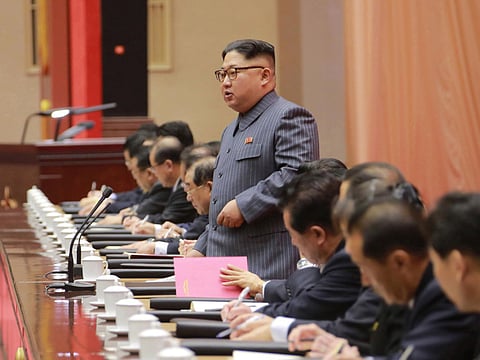US is not out of options on North Korea
With millions of lives hanging in the balance, the predictions on the probability of war is not the best way to treat a complex international challenge

With tension continuing to build between the United States and North Korea, there’s growing talk by politicians and TV pundits that we are on the brink of war. In truth, we shouldn’t be anywhere close.
This increasingly hot war of words — including loose talk about the probability of war — does nothing to bring us closer to where we need to be on North Korea, especially when military options short of war remain on the table. In fact, with millions of lives at stake, waging a war of words is a distraction from the serious task at hand. Any kind of war — especially nuclear war — should not be an option until all other options are exhausted. And, in the case of North Korea, there are several roads not yet taken.
First, North Korea is not, as some claim, “sanctioned-out”. America is nowhere near to applying the same type of restraints on North Korea that were successful in bringing Iran to the negotiating table. In fact, the breadth of sanctions that the United States has placed on North Korea to date are far less than what was applied in earlier crises on Russia, Syria and Iran. While American sanctions on North Korea have clearly escalated, the US still has the option to penalise and seize the assets of North Korea’s enablers in other countries that enable Pyongyang to evade the full brunt of financial measures. The US can expand its focus on shipping and work with its allies to deny maritime insurance to the vessels heading to or from North Korea. Last month, the US targeted sanctions on 20 such vessels. Many more North Korean vessels are active and engaged in illicit activities beyond the small number designated by the Treasury Department.
America can also do more to expose those who use North Korean slave labour and to block any remittances back to Kim Jong-un’s regime.
Second, none of this will work without more pressure to hold the reluctant Chinese government accountable for the commitments it has made and to target more Chinese entities that support the North Korean government. The overwhelming majority of North Korea’s trade — 90 per cent — is with or facilitated by China, and despite agreed-upon United Nations sanctions, much of this economic activity continues. Actions should include targeting a greater number of Chinese banks that deal with North Korea, fining their US subsidiaries and freezing their US assets.
This year, the international banking transaction network, known as SWIFT [Society for Worldwide Interbank Financial Telecommunication], moved to prevent North Korean banks from using the global messaging system to facilitate international transactions, but that doesn’t impact Chinese banks that transact for the North Koreans. We should consider expanding this ban to include Chinese banks with any North Korean connections.
Finally, America needs to ask: Where are its allies on all of this? Instead of threatening a bilateral war between the US and North Korea, America should be working with its allies — including South Korea and Japan — to threaten increased multilateral pressure to choke the North Korean regime. While economic sanctions have not proved to be effective yet, they have not been fully exhausted and tested. Part of the reason the previous administration succeeded in bringing Iran to the table — regardless of the flaws of their final deal — was due to internationally coordinated sanctions. Thankfully, the UN Security Council has adopted three rounds of such sanctions this year, including significant measures last week.
With millions of lives hanging in the balance, the last thing we need is to have politicians and pundits predicting odds on the probability of war. It’s neither an accurate nor a helpful way to treat a complex international challenge.
— Washington Post
John R. Kasich, a Republican, is the Governor of Ohio.


